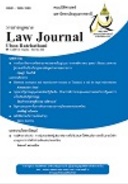Maternal surrogacy and reproductive tourism in Thailand: a call for legal enforcement
คำสำคัญ:
Reproductive tourism, Surrogate mother’s protection, Intended parents, Gestational carrier, Surrogacy contracts, Child’s interest and welfare, Thailand, การท่องเที่ยวเชิงการแพทย์เพื่อการสืบพันธุ์, การตั้งครรภ์แทน, ผู้ที่ขอให้มีการตั้งครรภ์แทน, ประเทศไทยบทคัดย่อ
Legal constraints and high costs on access to technologies have led an increasing number of patients to cross international borders to have children. This phenomenon has rapidly increased in the past few years and Thailand has become one of the major international commercial surrogacy destinations providing assisted reproductive services to individuals from all over the world at affordable costs. Most of the time, reproductive agreements have lead to a positive outcome satisfying all parties involved: intended parents, gestational carriers, private clinics and agencies. In some cases, however, reproductive arrangements have given rise to legal issues and generated controversies in terms of protection of intended children, legal parenthood and enforceability. In order to minimize some of these undesired outcomes, Thai authorities should enforce new legislations to cope with this issue, potentially using United Kingdom or Israel as model. The new legal framework should balance all parties’ interests and guarantee a regulated way of engaging in surrogacy in the child’s interest
เนื่องจากประเทศไทยยังไม่มีกฎหมายเกี่ยวกับการตั้งครรภ์แทนอย่างชัดเจนส่งผลให้ธุรกิจการท่อง เที่ยวเชิงการแพทย์เพื่อการสืบพันธุ์ในประเทศไทยเติบโตในอัตราค่อนข้างสูงชาวต่างชาติหลาย ครอบครัวเลือกประเทศไทยเป็นจุดหมายปลายทาง ซึ่งแนวทางปฏิบัติที่ใช้อยู่ในปัจจุบันคือข้อบังคับ ของแพทยสภาในมาตรฐานการให้บริการเทคโนโลยีช่วยการเจริญพันธุ์ (ART) ในปี 1997 และ 2001(ประกาศ 1/2540 และ 21/2545) ข้อตกลงส่วนใหญ่นำไปสู่ผลประโยชน์ที่ดีสอดคล้องกับทุกฝ่ายที่เกี่ยวข้อง: ผู้ที่ขอให้มีการตั้งครรภ์แทน, ผู้ตั้งครรภ์แทน, สถานประกอบการและหน่วยงานที่เกี่ยวข้องในบางกรณีการตั้งครรภ์แทนอาจก่อให้เกิดปัญหาทางกฎหมายและสร้างการถกเถียงกันในแง่ ของการคุ้มครองเด็ก, บิดามารดาที่ถูกต้องตามกฎหมายและวิธีการบังคับใช้เพื่อที่จะลดผลที่ไม่พึงประสงค์เหล่านี้ประเทศไทยควรกำหนดข้อกฎหมายใหม่เพื่อ ควบคุมปัญหาโดยอาจจะใช้สหราชอาณาจักรหรือประเทศอิสราเอลเป็นแนวทางในการร่างข้อกฎหมายเพื่อผลประโยชน์ของทุกฝ่ายและที่สำคัญเพื่อคุ้มครองเด็กที่เกิดจากการรับตั้งครรภ์แทน
ดาวน์โหลด
รูปแบบการอ้างอิง
ฉบับ
ประเภทบทความ
สัญญาอนุญาต
- บทความทุกบทความที่ตีพิมพ์ในวารสาร.....เป็น
- ข้อเสนอแนะในบทควมเป็นความรับผิดชอบของผู้แต่ง...



